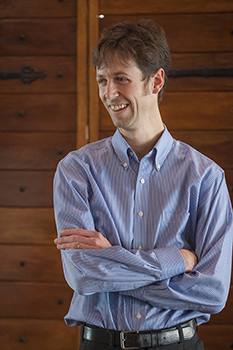Latest News Archive
Please select Category, Year, and then Month to display items
13 August 2024
|
Story Anthony Mthembu
|
Photo Sibahle Dayimani and Amandla Kulu
 Prof Peter Roseel, Managing Director of Management Consulting and Research – a spin-off of the Catholic University of Leuven in Belgium; and Prof Nicolene Barkhuizen, Director of the UFS Business School.
Prof Peter Roseel, Managing Director of Management Consulting and Research – a spin-off of the Catholic University of Leuven in Belgium; and Prof Nicolene Barkhuizen, Director of the UFS Business School.
The Business School at the University of the Free State (UFS) hosted Prof Peter Rosseel, Managing Director of Management Consulting and Research – a spin-off of the Catholic University of Leuven in Belgium – for a guest lecture during his visit to the UFS Faculty of Economic and Management Sciences (EMS).
The guest lecture took place on 19 July 2024 in the Business School Auditorium and was attended by academics from the UFS.
Reflecting on the lecture
The lecture presented by Prof Rosseel focused on how combining strategy, strategy implementation, culture transformation, leadership, and learning successfully leads to sustainable growth, creates engagement, and delivers tangible results. Throughout the lecture, Prof Rosseel spoke about how experts tend to make bad leaders and therefore stop change from happening within an organisation. In fact, he highlighted that, “Experts stop change from happening within the workplace because experts, by definition, look through the eyes of their expertise, but you cannot reduce the world to different forms of expertise, as it is holistic.” As such, he argued that to change an organisation, one must see things from the point of view of others.
Furthermore, Prof Rosseel delved deeper into the hierarchical operating model within organisations. He indicated that the above model should be one community within organisations; however, unfortunately it is not. This is because organisations are made up of several departments such as finance and human resources. As such, he regards these departments to be silos that could prove to be detrimental to organisations, as each silo can create its own culture as opposed to an organisational culture. These are some of the points he discussed throughout the lecture.
After the lecture concluded, the audience had the opportunity to engage with Prof Rosseel on his viewpoints. In fact, Lyle Markham, Academic Head of Department and Lecturer in Industrial Psychology at the UFS, was one of the audience members and described the lecture as insightful.
Stanford University hosts book launch for UFS Prestige Scholar
2015-12-14

Dr Christian Williams, a member of the Vice-Chancellor’s Prestige Scholars Programme, had his book launched by Stanford University. The book called National Liberation in Postcolonial Southern Africa: A Historical Ethnography of SWAPO’s Exile Camps will be available in South Africa early in 2016.
Photo: Sonia Small |
A launch for the much-anticipated book by Dr Christian Williams from the University of the Free State (UFS) was sponsored by the Humanities Center and the Center for African Studies of Stanford University in the USA, among others.
The launch of the book, National Liberation in Postcolonial Southern Africa: A Historical Ethnography of SWAPO’s Exile Camps, coincided with the 40th anniversary of Angola’s independence.
The book was published by Cambridge University Press in September 2015, and the launch at Stanford was on 16 November 2015.
This groundbreaking study, which will be available in South Africa early next year, has already been lauded for its invaluable contribution and the depth of its scholarship. The author is a senior lecturer in the Department of Anthropology of the UFS, and member of the Vice-Chancellor’s Prestige Scholars Programme (PSP). He is a former Fulbright scholar, and holds a doctorate from the University of Michigan in History and Anthropology.
National Liberation in Postcolonial Southern Africa follows members of the South West Africa People's Organization (SWAPO) through three decades of exile in Tanzania, Zambia, and Angola.
It highlights how different Namibians experienced exile, as well as the tensions that developed within SWAPO as Namibians encountered one another while officials asserted their power and protected their interests.
It also follows the return of Namibians who lived in exile to post-colonial Namibia, examining the extent to which divisions and hierarchies that emerged in the camps still continue to shape Namibians today.